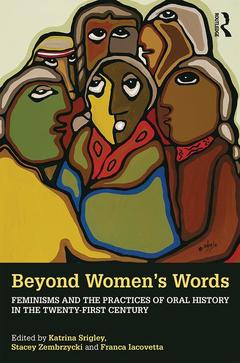Beyond Women's Words Feminisms and the Practices of Oral History in the Twenty-First Century
Coordonnateurs : Srigley Katrina, Zembrzycki Stacey, Iacovetta Franca

Beyond Women?s Words unites feminist scholars, artists, and community activists working with the stories of women and other historically marginalized subjects to address the contributions and challenges of doing feminist oral history.
Feminists who work with oral history methods want to tell stories that matter. They know, too, that the telling of those stories?the processes by which they are generated and recorded, and the different contexts in which they are shared and interpreted?also matters?a lot. Using Sherna Berger Gluckand Daphne Patai?s classic text, Women?s Words, as a platform to reflect on how feminisms, broadly defined, have influenced, and continue to influence, the wider field of oral history, this remarkable collection brings together an international, multi-generational, and multidisciplinary line-up of authors whose work highlights the great variety in understandings of, and approaches to, feminist oral histories.
Through five thematic sections, the volume considers Indigenous modes of storytelling, feminism in diverse locales around the globe, different theoretical approaches, oral history as performance, digital oral history, and oral history as community-engagement. Beyond Women?s Words is ideal for students of oral history, anthropology, public history, women?s and gender history, and Women?s and Gender Studies, as well as activists, artists, and community-engaged practitioners.
Preface Foreword: Sherna Berger Gluck Introduction: Franca Iacovetta, Katrina Srigley, and Stacey Zembrzycki
Section 1: Reflections on Women’s WordsSection Introduction: Linda Shopes Chapter 1 Katherine Borland, "That’s Not What I Said": A Reprise 25 Years On" Chapter 2 Sanchia deSouza and Jyothsna Latha Belliappa, "The Positionality of Narrators and Interviewers: Methodological Comments on Oral History with Anglo-Indian Schoolteachers in Bangalore, India" Chapter 3 Daphne Patai, "When is Enough Enough?" Chapter 4 Kathleen Blee, "Feminist Oral Histories of Racist Women" Chapter 5 Rina Benmayor, "Emotion and Pedagogy: Teaching Digital Storytelling in the Millennial Classroom"
Section 2: Doing Feminist Oral History Then and NowSection Introduction: Penny Summerfield Chapter 6 Lynn Abrams, "Talking about Feminism: Reconciling Fragmented Narratives with the Feminist Research Frame" Chapter 7 Lianne C. Leddy, "‘Are you only interviewing women for this?’: Indigenous Feminism and Oral History" Chapter 8 Uma Chakravarthy and Ponni Arasu, "Living, Archiving, and Reflecting on Feminism and Activism in India: An Oral History with Uma Chakravarti" Chapter 9 Valerie Korinek, "Locating Lesbians, Finding ‘Gay Women,’ Writing Queer Histories: Reflections on Oral Histories, Identity, and Community Memory" Chapter 10 Nadje Al-Ali, "Memory, History, and Contestations in Present-Day Iraq"
Section 3: Decentering and Decolonizing in Feminist Oral HistorySection Introduction: Nan Alamilla Boyd Chapter 11 Theresa de Langis, "Speaking Private Memory to Public Power: Oral History and Breaking the Silence on Sexual and Gender-Based Violence during the Khmer Rouge Genocide" Chapter 12 Sue Anderson, Lorina Barker, and Jaimee Hamilton, "Yarning up Oral History: An Indigenous Feminist Analysis" Chapter 13 Stéphane Martelly, "‘This thing we are doing here’: Listening and Writing in the Montreal Life Stories Project" Chapter 14 Grace Akello, "Intersubjective Experiences and a Depiction Beyond Written Words doing Ethnography with Wartime Children in Northern Uganda" Chapter 15 Hillary Hiner, "Putting the Archive in Movement: Testimonies, Feminism, and Female Torture Survivors in Chile"
Section 4: Feminists in the Field: Performance, Political Activism, and Community Engagement Section Introduction Paul Ortiz Chapter 16 Penny Couchie and Muriel Miguel, "Storyweaving, Indigenous Knowledge, and Process in Material Witness" Chapter 17 Sarah Loose with Amy Starecheski, "Oral History for Building Social Movements, Then and Now" Chapter 18 Suroopa Mukherjee, "Women Power and Feminine Solidarity: Oral History, Life Stories, and Trauma in the Context of an Industrial Disaster" Chapter 19 Sady Sullivan, "Public Homeplaces: Collaboration and Care in Oral History Project Design" Chapter 20 Hourig Attarian, Shahrzad Arshadi, Khadija Baker, and Kumru Bilici, "Come Wash With Us: Seeking Home in Story"
Section 5: Listening to and Learning from Stories in the Digital WorldSection Introduction: Anna Sheftel Chapter 21 Margo Shea, "Feminist Oral History Practice in an Era of Digital Self-Representation" Chapter 22 Mary A. Larson, "The Medium is Political and the Message is Personal: Feminist Oral Histories Online" Chapter 23 Elise Chenier, "Oral History’s Afterlife" Chapter 24 Ruth Percy, "Women’s Words from the Archives" Chapter 25 Heather A. Howard, "‘Shut the tape off and I’ll tell you a story’: Women’s Knowledges in Urban Indigenous Community Representations"
Index
Katrina Srigley is Associate Professor in the Department of History at Nipissing University. Author of the award-winning monograph Breadwinning Daughters: Young Working-Women in a Depression Era City (2010), her current collaborative work with Nipissing First Nation focuses on the history of Nbisiing Anishinaabeg territory.
Stacey Zembrzycki is a teacher at Dawson College. She is the author of According to Baba: A Collaborative Oral History of Sudbury’s Ukrainian Community (2014) and its accompanying website www.sudburyukrainians.ca, and is co-editor of Oral History Off the Record: Toward an Ethnography of Practice (2013).
Franca Iacovetta is Professor of History at the University of Toronto and co-editor of Studies in Gender and History at University of Toronto Press. A past president of the Berkshire Conference of Women Historians, she is author or editor of ten books, including the award-winning Gatekeepers: Reshaping Immigrant Lives in Cold War Canada (2006).
Date de parution : 05-2018
15.6x23.4 cm
Disponible chez l'éditeur (délai d'approvisionnement : 14 jours).
Prix indicatif 50,12 €
Ajouter au panierDate de parution : 05-2018
15.6x23.4 cm
Thème de Beyond Women's Words :
Mots-clés :
Oral History; Cultural Relational Theory; Women's Words; Digital Oral History; Sherna Berger Gluck; Oral History Scholarship; Daphne Patai; CIA Training; Multigenerational; White Power Skinhead Groups; Indigenous; Oral History Review; Third World; Feminist Oral History; Feminist; Open Source Software; Feminism; Migrant Mexican Farmworkers; Gender; Oral History Performance; anti-colonial; National Library; LGBTQ; El Barrio Popular Education Program; digital; Online Oral History; performance; Oral History Practices; community; Indigenous Oral Historians; Oral History Process; Women’s Words; Linda Shopes; Archived Oral Histories; Oral History Narratives; Oral History Methods; Oral History Recording; Activist Oral History; Iraqi Kurdistan
